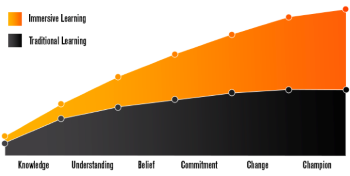Why immersive learning?
Written by: Natalie Hurley, Learning Strategy Director, BI WORLDWIDE
(View Author Bio)
All training courses share knowledge. Good ones include hands-on application. Great ones engage emotions.
Scroll Down
An impactful learning experience
How do you create Aha! moments for your learners? You can introduce content in unique ways. You can model skills to show what good looks like. You can reinforce key messages to ensure they are retained. But can you create a learning experience that allows your learner to have that Aha! moment?
Companies rarely see training that replicates a realistic experience. That’s exactly what immersive learning is – an experiential and emotional learning experience that gets learners out of their chairs and brings the content to life in a unique way. It’s a powerful way to translate knowledge into behavior change – and it might be what’s missing from your training programs.
Disrupting the everyday, training-as-usual experience with immersive learning lets learners engage in and absorb ideas. A great immersive learning environment immediately heightens the senses as learners are plunged into a setting far different than they had anticipated. The result — a more impactful learning experience.
Real-world application
A pharmaceutical client had a big challenge: how to engage, energize and inspire a sales force for an underperforming product.
A recent change in executive sales management, a sales force expansion and a highly compressed timeline further intensified their situation. The traditional approach—general sessions, patient panel, workshops, a certification, and so on — was insufficient for this challenge. Instead of “business as usual,” we created an emotional learning experience that provided the maximum impact.
We started with our Blueprinting process which entails completing audience and content analysis, identifying instructional and competency goals, mapping the measurement and coaching strategy, and finally, identifying the KNOW | FEEL | DO for each audience type. Armed with our insights, our Account Team designed a holistic, immersive experience:
- How do we make the training as real as possible to the field’s everyday lives?
- How do we train the field to address market access hurdles?
- How can we compliantly certify 1,000+ attendees in an energizing way?
Our non-traditional approach was just what our client needed to re-energize their salesforce.
Instead of practicing with a partner at the table level, we created immersive workshop environments that mirrored the field’s everyday interactions with their customers ranging from an Emergency Department floor to a Primary Care waiting room. The workshops kept participants actively involved in the content; they practiced navigating and verbalizing scenarios to multiple stakeholders in multiple environments, received feedback from their peers and managers and reflected on lessons learned.
Rather than a typical Market Access workshop, we designed a self-directed, interactive Market Access Maze. This immersive approach enabled our adult learners to engage with case studies, see new tools in action, gain exposure to key messaging and reflect as a group before applying the content.
In place of a “check-the-box” certification, we designed an immersive experience that created an opportunity for participants to have an ‘aha moment’ and maintain a high level of engagement during downtime. We leveraged existing content to design a competitive series of customized games focused on the skills and knowledge practiced throughout the week. For the certifications, we utilized the immersive environments and involved knowledgeable third parties to allow managers to focus on documenting quality feedback.
The results
After the training, 99% of participants agreed they could confidently present the complete product story to a variety of health care providers (HCPs). By appealing to the field’s tendency to absorb information when presented in a vibrant, personally relevant and emotional way, we engaged, energized and inspired them.
They left the training with the tools and skills needed to confidently present the product’s story and successfully achieve the company’s sales objectives.
Designing for behavior change
We are inspired by Kolb’s Experiential Learning Theory which defines experiential learning as "the process whereby knowledge is created through the transformation of experience. Knowledge results from the combination of grasping and transforming experience." [i] Kolb's Experiential Learning Theory contains four elements; concrete experience, reflective observation, abstract conceptualization, and active experimentation.[ii]
 Our approach leverages this theory and allows us to inject our expertise to create purpose. We strategically design immersive learning that starts with foundational knowledge, understanding and belief of our purpose – and then builds towards committing, investing and ultimately championing the purpose. Our immersive tactics are seamlessly integrated to create a training that is engaging and effective.
Our approach leverages this theory and allows us to inject our expertise to create purpose. We strategically design immersive learning that starts with foundational knowledge, understanding and belief of our purpose – and then builds towards committing, investing and ultimately championing the purpose. Our immersive tactics are seamlessly integrated to create a training that is engaging and effective.
Good learning solutions start with knowledge and understanding. Building on that baseline, BI WORLDWIDE designs solutions that leverage immersive elements to create the emotional impact and intensity required to advance the learner to belief, commitment and behavior change.
[i] Immersive Learning Related to Theory and Practice of Blended Learning
[ii] Kolb, David A. 1984. Experiential Learning: Experience as the Source of Learning and Development. Prentice-Hall, Inc., Englewood Cliffs, N.J.













